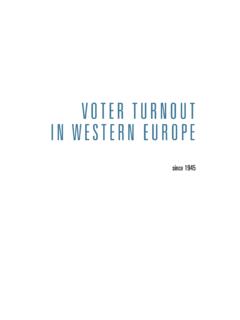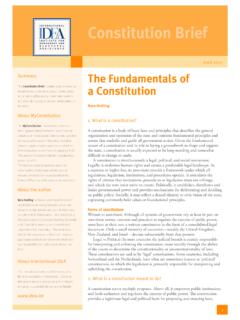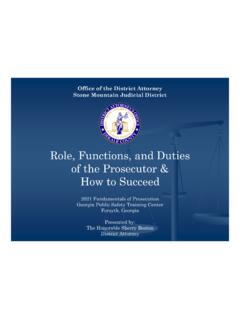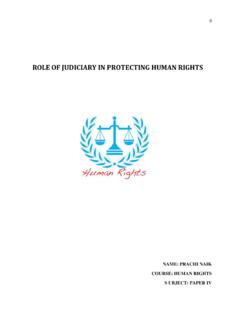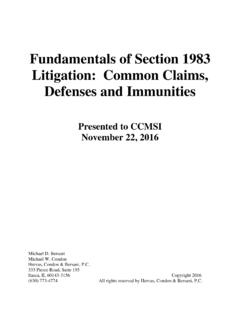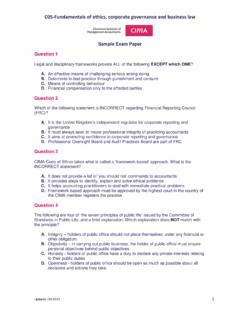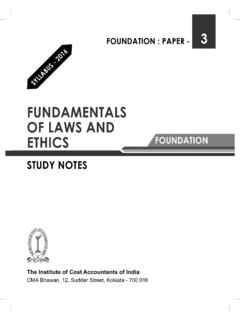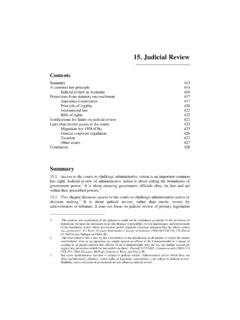Transcription of The Fundamentals of Constitutional Courts - IDEA
1 1 Constitution BriefApril 2017 Summar yThis Constitution Brief provides a basic guide to Constitutional Courts and the issues that they raise in constitution-building processes, and is intended for use by constitution-makers and other democratic actors and stakeholders in Myanmar. About MyConstitution The MyConstitution project works towards a home-grown and well-informed Constitutional culture as an integral part of democratic transition and sustainable peace in Myanmar. Based on demand, expert advisory services are provided to those involved in constitution-building efforts. This series of Constitution Briefs is produced as part of this effort. The MyConstitution project also provides opportunities for learning and dialogue on relevant Constitutional issues based on the history of Myanmar and comparative experience.
2 About the author Andrew Harding is a leading Asian law scholar working on Malaysia, Thailand and Myanmar, as well as comparative law and law and development. He is a former Director of the Centre for Asian Legal Studies and the Asian Law Institute at the National University of Singapore, where he is now based. He recently edited Constitutionalism and Legal Change in Myanmar (Hart Publishing, January 2017). He is currently co-editing, with Professor Albert Chen, a book on Constitutional Courts in Asia for Cambridge University Fundamentals of Constitutional CourtsAndrew Harding 1. What are Constitutional Courts ?A written constitution is generally intended to have specific and legally binding effects on citizens rights and on political processes such as elections and legislative procedure. This is not always true: in the People s Republic of China, for example, it is clear that Constitutional rights may not be enforced in Courts of law and the constitution has only aspirational, not juridical, a constitution is intended to be binding there must be some means of enforcing it by deciding when an act or decision is contrary to the constitution and providing some remedy where this occurs.
3 We call this process Constitutional review . Constitutions across the world have devised broadly two types of Constitutional review, carried out either by a specialized Constitutional court or by Courts of general legal jurisdiction. There are however many variations on each model, and some systems are even said to be hybrid . A Constitutional court (sometimes called a Constitutional tribunal or Constitutional council ) is a special type of court that exercises only the power of Constitutional review. It is defined by Alec Stone Sweet as a constitutionally-established, independent organ of the state whose central purpose is to defend the normative superiority of Constitutional law within the juridical order . In other words, its role is to review laws, and usually also executive acts and decisions, to decide whether they are constitutionally valid and provide a remedy in cases where they are not.
4 It exercises this power exclusively: no other court or body can engage in Constitutional review. Bodies of this kind exist in about 85 countries around the world that is, a majority of countries that have a system of Constitutional review. Since Constitutional Courts exercise exclusive jurisdiction over Constitutional matters, this system is often called the centralized system of Constitutional review. It also called the European system given that it was invented by the Austrian legal scholar Hans Kelsen and is found in European states such as Austria, Germany, Italy and Spain, and those influenced by them, such as Colombia, Russia, Republic of Korea, Turkey and Taiwan. This centralized system contrasts with systems in which Constitutional review is carried out by a court with general jurisdiction over all questions of civil, criminal and public law not just Constitutional questions.
5 In such systems, any court can engage in Constitutional review. Typically in this system the power to decide Constitutional questions with finality lies with the highest (apex) court , usually the supreme court , indicating its primacy over other Courts . Since this latter About International IDEAThe International Institute for Democracy and Electoral Assistance (International IDEA) is an intergovernmental organization with a mission to support sustainable democracy IDEA Constitution Brief, February 2017system is not centralized and was prominently developed in the United States, it is sometimes called the diffused or American system. Examples may also be seen in Argentina, Australia, Canada, India, Japan and the Philippines. Most countries that have a Constitutional court also have a supreme court , but the latter does not have jurisdiction over Constitutional questions.
6 Constitutional Courts , unlike Courts of general jurisdiction, do not preside over civil or criminal litigation. Furthermore, unlike general Courts they are often empowered to decide abstract questions that do not arise as a set of facts giving rise to a specific or concrete legal dispute between parties (see Box 1). Most states with a Constitutional court have created it (or have dramatically reformed an existing institution, as in Taiwan) as part of a constitution-making or Constitutional -reform exercise within the last 30 years. The Constitutional court is usually seen as an essential mechanism to achieve and entrench democratic reforms, such as instituting multiparty democracy. States that have created Constitutional Courts have done so largely because they see the court as a necessary guardian of democratic institutions, constitutionalism and fundamental rights following a period of military dictatorship or totalitarian government.
7 Accordingly, unlike the generality of Courts in a diffused system, Constitutional Courts are specifically charged with deciding political questions although, obviously, they have to do so with great care and judgement. In general, Constitutional Courts have decided cases in such a way as to encourage democratic politics and dialogue between different organs of the state. As multiparty democracy and Constitutional government have diffused globally, most constitution-makers have preferred the centralized model to the diffused model of Constitutional review. Consequently, in the 1990s the centralized model already well established in Western Europe spread rapidly across Eastern and Central Europe, West Africa, South America, East Asia and elsewhere. Constitutional Courts are more typical of civil law countries than common law countries.
8 Most European and Asian countries use the civil law system. In the British Commonwealth, which consists almost entirely of common-law countries, the diffused model is almost universal (South Africa is a notable exception). Francophone West African and Middle Eastern countries invariably use the centralized model. Some civil law countries ( Japan) use the diffused system, while some common law countries ( Myanmar) use the centralized system. Prominent and influential examples of the centralized system around the world include Colombia, France, Germany, Indonesia, Republic of Korea, Spain and Taiwan (all civil law countries), and South Africa (which displays a mix of common and civil law). However, not all civil law countries use the centralized system (Argentina, Japan and Sweden, for example, do not).
9 Prominent examples of the diffused system include the Australia, Canada, India, Malaysia, Nigeria, the United Kingdom and the United States (all common law countries). The United Kingdom does not have a unified written constitution, but its high Courts and newly reformed supreme court decide questions of Constitutional significance. The main motivation in establishing a Constitutional court is to create a strong and specialized judicial-type body capable of enforcing a new constitution or a new Constitutional deal. Reforming an existing apex court or giving it powers of Constitutional review, as in the diffused system, has not generally been considered adequate to the task. A major and influential example is Germany s Federal Constitutional court , established in 1949 under the post-war Basic Law. However, Constitutional Courts have also played an important part in encouraging elements of democratization, even under authoritarian regimes ( in Egypt both before and after the Arab Spring).
10 2. What are the powers of Constitutional Courts ? Apart from exercising exclusive jurisdiction over Constitutional questions, there are in fact virtually no powers that all Constitutional Courts have in common (apart Box 1. Constitutional Courts and abstract reviewConstitutional Courts are often empowered to decide on abstract questions. For instance, a Constitutional court may have power to examine the constitutionality of a law before it is passed. A group of members of parliament, for example, may be able to bring a case on this basis, alleging a potential violation of individual rights or democratic process, without any concrete application of the law to examine. This is impossible in a diffused system, which recognizes concrete review rather than abstract IDEA Constitution Brief, February 2017from the Constitutional review of legislation, and even this power is variable in its scope and effect).


